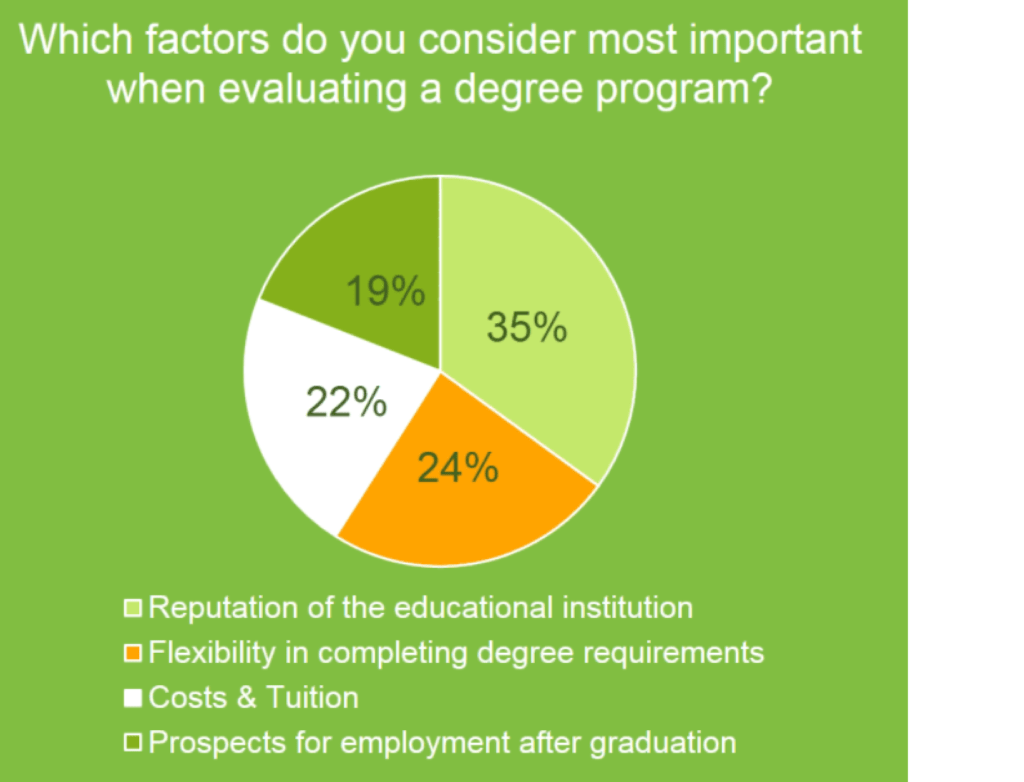Choosing Your College Degree
Most Important Factors for Choosing a College Degree
In a recent survey of prospective college students performed by Sparkroom, students from across the country provided key insights into their college decision making process. The survey responses varied from location to cost and from curriculum to support. To help you better understand the thought processes involved with making a decision on which college degree to pursue, we have aggregated the responses into four primary buckets.
The four most popular factors involved in making a decision about college include the following:
- Reputation
- Flexibility
- Cost
- Employment
Below you will find a summary of the survey in a graphic form to help you better visualize the impact of each variable in the decision-making process.

Let’s dive into each factor to help you make sense of the factors considered by prospective college students from around the country.
How Important is a College’s Reputation?
Reputation of the College or University: Fully 35% of survey respondents believed that a school’s reputation was the largest driver in the decision-making process. Let’s break this down a bit further to determine what students are really attempting to assess. In other words, is the reputation an intrinsic value or benchmark set by others.
Reputation of a college can entail student services, professors, degree programs, rankings, graduation rate, alumni, curricular design, and what friends say about the school. To understand what factors affect your school choice, take the time to read our Complete College Admissions Guide and establish your personal priorities. Once you intimately understand your priorities, you can more accurately assess a school’s reputation based on those important criteria.
Is Flexibility Important When Considering a College Degree?
Flexibility: The notion of flexibility has changed markedly in the past two decades. A primary driver has been the advent of online colleges and online degree program. Online learning or distance learning, has provided students a new baseline for college. In other words, there is no longer a singular option to consider.
Even though online learning is the single fastest growing segment within higher education, more students still prefer the classroom model. Flexibility is the notion of being able to take classes at a time that fits a student’s schedule. Cranking up time as time allows and stepping back as competing priorities come into play.
Distance learning or hybrid classes provide this flexibility for students looking to earn a college degree while maintaining a proper balance. Find your perfect college match by utilizing our proprietary search tool for Online Degree programs. To get a broad sense of the ever-changing demographics of college students, visit The Gates Foundation for a unique look at today’s student.
How Important is the Cost of a Degree?
Cost: As a surprise to most, cost is not the first criteria used in making a decision about college by prospective students. The fact remains that the various grants, scholarships, work-study programs, fellowships, and loans helps students bridge this gap as never before. To illustrate this point, private colleges in the United States average a 49% discount off published tuition rates.
The broad-based survey performed by The College Board underscores the net costs involved in attending college today instead of the published sticker prices. When considering the cost of college, it is important to factor in all aspects of attending school. From tuition and parking fees to room and board, it all adds up and must be understood prior to matriculation.
How Employable Will I Be After Graduation?
Employment: The fourth most important factor in the survey reveals that 19% of respondents believe employment options after graduation is critical. The fact remains, there is a tight link between education attainment with income and employment. In other words, the more education you have the more money you are likely to make on average with a lower rate of unemployment.
The BLS published a report this year showing this correlation. Specifically, a person earning a bachelor’s degree will make more than twice a person with a high school diploma with twice the employment security. This trend holds true for each degree level through graduate degrees with increasing income and decreased unemployment.
Further, the US Census Bureau published a study illuminating the cost of not attending college. One noteworthy piece of data is the following: average annual earnings for a citizen with a high school diploma is $35,615 while someone holding a bachelor’s degree will average $65,428 a year. Over a career of 20 years, that translates to a $600,000 difference in income.
Choosing the Best College Degree for You
At the end of the day, your factors for deciding upon a college degree will be uniquely yours. When considering upon a college degree to pursue, it is important to remember to be thoughtful, organized, honest, and challenge yourself to attain the best for yourself. Take into consideration the impact your decision will be on the stability of your career, the overall cost of earning that degree, the school’s reputation, and how flexible the university is after accepting your offer letter. Make the most of your skills and talents by leveraging education to your benefit. Continued success!
Colleges and Universities in Your State
For additional resources, make sure to visit MatchCollege and subscribe to our blog for the latest in college information.






